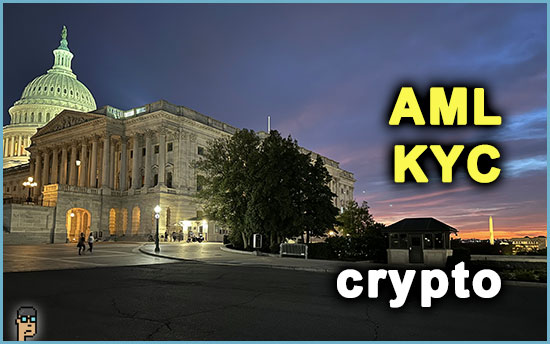market structure markup
The House Agriculture Committee confirmed late yesterday that this week’s House Ag markup led by Chair Glenn “GT” Thompson (R, PA) for the digital assets market structure bill – a.k.a. H.R. 4763, “The Financial Innovation and Technology for the 21st Century Act” – is scheduled for Thursday at 10 a.m.
See the hearing’s landing page. Live stream will be here, too.
This is the day after Chair Patrick McHenry (R, NC) will lead House Financial Services Committee and its markup hearing on the market structure bill as well as six others.
With Majority leader Rep. Tom Emmer (R, MN) joining the bill, the hope is that a House vote will be possible in the September-October time frame.
AML-KYC clouds
Even with first-ever, digital assets legislation reaching the markup stage in the House Financial Services and Agriculture Committtees, there are plenty of clouds gathering for crypto in Congress observes Politico’s Eleanor Mueller.
She sees the recent Lummis-Gillibrand and Warren-Marshall partnership over a National Defense Authorization Act (NDAA) amendment as a sign of wider misgivings in Congress – the Senate, in particular – that center around enforcement of anti-money laundering (AML) and know-your customer (KYC) requirements for crypto. The new CANSEE legislation supported by a bipartisan group of Senators including its lead sponsor, Sen. Jack Reed (D, RI), strikes similar AML/KYC “notes.”
Mueller writes, “Even allies like Sen. Cynthia Lummis (R, WY) – dubbed the Senate’s ‘crypto queen’ – are warning that the industry needs to accept the emerging political reality.” Read it.
Put very simply, what’s the compromise that can be struck between cryptography and the need to identify?
Rep. Jim Himes (D, CT) – echoing some of his thoughts at last week’s Atlantic Council webcast on stablecoins with Rep. French Hill (R, AR) – says, “I just think there’s a lot of nonsense in this industry.”
Proof of Reserve (PoR)
In an opinion piece in Fortune, crypto venture capitalist Nic Carter, who was the first to level “Choke Point 2.0” accusations against the U.S. government back in February, advocates for self-regulation for crypto and a concept known as “Proof of Reserves (PoR).”
Carter says, “We ask simply that Washington stop undermining the industry’s efforts to clean itself up, recognize the validity of PoR, and facilitate its proliferation across the industry. Lawmakers should encourage the accounting standards setting bodies, like the FASB or the PCAOB, to ratify industry efforts around PoR so audit firms feel empowered to supervise them. And they should recognize the good work that custodians are already doing to make themselves more transparent and accountable.” Read his op-ed.
more tips:
What are Proof of Reserves (PoR)? – Decrypt
Coinbase v. SEC
The court proceedings between Coinbase and the Securities and Exchange Commission (SEC) appear to be picking up speed. In a tweet on Sunday, Coinbase Chief Legal Officer Paul Grewal thanks Judge Katherine Failla, the District Judge overseeing the SEC lawsuit against the cryptocurrency platform company and posts a letter sent by the judge late last week. See it.
Lawyer James Murphy, known as @metalawman on X.com (was Twitter), breaks down the letter and the schedule ahead calling it “a fast schedule for a big case in the [Southern District of New York courts].”
Aug 4: Coinbase opening brief
Aug 11: Amicus briefs supporting Coinbase
Oct 3: SEC opposition brief
Oct 10: Amicus briefs supporting SEC
Oct 24: Coinbase reply brief
Worldcoin
OpenAI CEO Sam Altman and his Worldcoin co-founder Alex Blania launched Worldcoin yesterday with reportedly over 2 million people already signed up – mostly from the global south – and aspires to be a “new identity and financial network.” Read more from TechCrunch. And, The Block.
Altman and Blania explain in a launch letter , “Worldcoin consists of a privacy-preserving digital identity (World ID) and, where laws allow, a digital currency (WLD) received simply for being human. We hope that, where the rules are less clear, such as in the U.S., steps will be taken so more people can benefit from both.” The first step for any user is a retinal eye scan and, in return, users receive 25 WLD tokens.. Read the letter.
In a post that explains some of the details of Worldcoin yesterday, Ethereum co-founder Vitalik Buterin has obiously taken a deep interest in the WorldCoin project and opines on its purpose including risks such as a threat to privacy.
Buterin begins with his own concept called “Proof of personhood” which relates to Worldcoin. He writes, “‘Proof of personhood,’ aka the ‘unique-human problem‘, is a limited form of real-world identity that asserts that a given registered account is controlled by a real person (and a different real person from every other registered account), ideally without revealing which real person it is. Read his detailed post.
Eye scans and crypto: think certain members of Congress will look into Worldcoin?
more tips:
What is Worldcoin? (the condensed version) – Forbes
DeFi event
Looking for something to do toward the end of the August’s Congressional recess? DeFi Retreat in Brooklyn, NY, will be bringing together digital assets enthusiasts to discuss the collision of finance and decentralization. One panel promises to look at the evolution of regulation with participants that include Terranet Ventures’ Carole House, a16z’s Brian Quintenz and BitGo’s Chief Compliance Officer Jeff Horowitz.
House is a current member of the Commodity Futures Trading Commission’s (CFTC) Technology Advisory Committee (TAC) and former White House Director for Cybersecurity and Secure Digital Innovation. Quintenz is a former Commissioner of the CFTC. Horowitz served as Coinbase’s Chief Compliance Officer just prior to joining BitGo.
see more tips
Coinbase CEO Brian Armstrong shows off his company’s out-of-home brand awareness campaign in D.C. – X.com
Wall Street Is Grappling With Crypto’s Trillion-Dollar Custody Question – Bloomberg
Putin Signs Digital Ruble Law Making a CBDC Possible in Russia – CoinDesk

